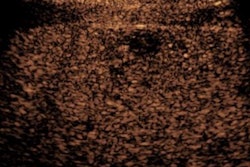Focused ultrasound treatments can prevent the degeneration of brain cells in healthy mice, potentially slowing down the aging process, Australian researchers reported in a study published online October 11 in PLOS One.
The research follows up on a previous study conducted by the Queensland Brain Institute's Clem Jones Centre for Ageing Dementia Research that showed ultrasound treatments could reverse Alzheimer's disease in mice. In the new study, the researchers initially sought to assess the safety of the technology.
They found that the treatment did not cause any damage to the brains of healthy mice, and it could also yield potentially beneficial effects, according to lead author Robert Hatch, PhD.
In normal healthy brains, the structure of the neuronal cells in the hippocampus -- an area of the brain that is important for learning and memory -- is reduced with age. However, the ultrasound treatments temporarily open the blood-brain barrier, activating mechanisms that clear toxic protein clumps and restore memory functions, according to the researchers.
"What we found is that treating mice with scanning ultrasound prevents this reduction in structure [of the neuronal cells in the hippocampus], which suggests that by using this approach we can keep the structure of the brain younger as we get older," Hatch said in a statement.
In the next phase of the research, the group is testing the effects of ultrasound on the brain structure and function of older mice.
"We are currently conducting experiments to see if this preservation of the brain cell structure will ameliorate reductions in learning and memory that occur with aging," Hatch said.



















